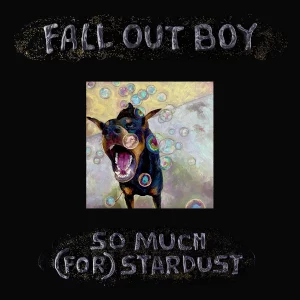So Much For The Old Fall Out Boy: A Review and Deep Dive Into FOB’s Eighth Studio Album
It should be mathematically impossible to combine pop punk, soul, synth, disco, classical music, theatrical melodies, Ethan Hawke’s monologue from 90’s romcom, Reality Bites, a gospel choir, and baseball into one album and still maintain cohesion. However, Fall Out Boy is a band built on contradictions. Thanks to vocalist Patrick Stump’s affinity for flowing, lyrical cohesion and bassist/lyricist Pete Wentz’s desire to rework, rethink, and reinvent common phrases, forces that are inherently at odds with one another have found common ground on Fall Out Boy’s discography. Their eighth studio album, So Much (For) Stardust, is a triumphant opposition.
 The album leads with two previously released singles, the transition between the tracks serving as the first declaration that this album is not bound to any one genre. The songs don’t slide into each other, there is a harsh distinction between the pop subgenres. The pop punk introduction contrasts its radio-formulated pop successor. From there, the album doesn’t shy away from swerving into the all lanes of genre.
The album leads with two previously released singles, the transition between the tracks serving as the first declaration that this album is not bound to any one genre. The songs don’t slide into each other, there is a harsh distinction between the pop subgenres. The pop punk introduction contrasts its radio-formulated pop successor. From there, the album doesn’t shy away from swerving into the all lanes of genre.
Throughout all the shifting styles, there remains a level of familiarity in each song. Together, the tracks all have elements that could be sorted into FOB’s previous albums. “Heaven, Iowa” has elements of a heart trembling ballad set to steady guitars and sounds like a scrapped track from Folie a Deux; the spoken lyrics of “Baby Annihilation” could easily appear on From Under The Cork Tree; “The Kintsugi Kid” and its sweeter sounding pop is reminiscent of American Beauty/American Psycho. According to Wentz, “Our band has been an ongoing art project for 20 years, and we know there have been many inception points along that journey. We wanted to create an album that merged those points together–something new, but carved from our foundation.” Traces of Fall Out Boy’s past projects are the grounding factor of this album. It explores themes of regret, nostalgia, and time which are only elevated by the musical fragments of the band’s past.
Even without the support of their previous work, So Much (For) Stardust is an exceptional album on its own. The songs build in quality and seriousness the deeper you wade into the track list. The first six songs are catchy and lyrically impressive, but a stark shift comes in on the seventh track, “The Pink Seashell.” Set to the echoing pluck of guitar strings, Ethan Hawke’s monologue from Reality Bites is inarguably introspective. With phrases like, “So I take pleasure in the detail,” and, “I sit back and I ride my own melt,” it’s clear that Fall Out Boy is trying to tell us something. But the tone shifts quickly as the instrumental introduction to “I Am My Own Muse” sounds, reminiscent of an 80s fantasy arcade game. It breaks away into the clawing refrain, “So drop a bomb on all the things we dreamed about / smash all the guitars / till we see all the stars.”
And the narrative clicks into place. Fall Out Boy isn’t writing songs that sound like their past lives to cash in on nostalgia or because they’re out of new ideas–they’re doing it to tell a story. I won’t argue that So Much (For) Stardust is a concept album, but there are currents of story and theme running right beneath the surface of every song. The fantasy motif throughout the album and music videos situates us in a dark fairytale: a land filled with excitement and possibility and adventure. But, the way that the songs’ cheery tones clash against the pessimistic lyrics break the mirage. Even within the title of the album, So Much (For) Stardust, the use of parentheses stains the magical allusion, making us wonder if the stardust was ever really there, or if it was just an empty promise. Even for an ‘emo’ band, this is exceptionally existential. This album is not a homage to previous records, it is a tale of confusion, being caught somewhere between disillusion and submitting yourself to the fantasy of hope.
 The titular track, “So Much (For) Stardust” closes out the album and furthers the fascination with nostalgia. After gloomy classical music fades, Stump’s powerful vocals convey uncertainty in the chorus as he sings, “So much for stardust / we thought we had it all, thought we had it all.” It is a refreshingly cynical outlook on the past (especially when compared to other pop punk bands who seem to cling to the early aughts and the golden days of emo). Whatever idea that the fantasy might represent—a ‘normal’ life, eternal youth,—it is clear that they cannot have both it and the lives they now lead. In a heartbreakingly ingenious move, the bridge of the song echoes lyrics from the opening track, “In another life you were my babe / in another life, you were the sunshine of my lifetime / what would you trade the pain for? I’m not sure.” Even in the last moments of the album, there is no real answer, only the same question we started with. Though thematically unsatisfying, the song finishes with Stump’s desperate repetition of the chorus as it gets lost in the haze of solemn, overlapping choir voices. Purposefully unresolved, this album closes with one of the most quietly tragic moments in all of FOB’s heartbreaking discography.
The titular track, “So Much (For) Stardust” closes out the album and furthers the fascination with nostalgia. After gloomy classical music fades, Stump’s powerful vocals convey uncertainty in the chorus as he sings, “So much for stardust / we thought we had it all, thought we had it all.” It is a refreshingly cynical outlook on the past (especially when compared to other pop punk bands who seem to cling to the early aughts and the golden days of emo). Whatever idea that the fantasy might represent—a ‘normal’ life, eternal youth,—it is clear that they cannot have both it and the lives they now lead. In a heartbreakingly ingenious move, the bridge of the song echoes lyrics from the opening track, “In another life you were my babe / in another life, you were the sunshine of my lifetime / what would you trade the pain for? I’m not sure.” Even in the last moments of the album, there is no real answer, only the same question we started with. Though thematically unsatisfying, the song finishes with Stump’s desperate repetition of the chorus as it gets lost in the haze of solemn, overlapping choir voices. Purposefully unresolved, this album closes with one of the most quietly tragic moments in all of FOB’s heartbreaking discography.
Despite the refined storytelling skills, FOB’s eighth studio album is not without flaws. With such a diverse range of tracks, you’re sure to find a song you love, but also a song you hate. Personally, “What A Time To Be Alive” is my definition of insufferable. It sounds like a disco-inspired jiggle for a laundry detergent ad. But maybe you like songs with an influx of trumpets. Maybe you can’t stand the fast paced, lyrically dense “Hold Me Like A Grudge” even though it’s one of my favorites. An album that has something for everyone can’t be anyone’s favorite.

Is So Much (For) Stardust my preferred Fall Out Boy album? No. Do I think that it’s their best album? It very well could be. Andy Hurley’s drum beats are a rhythmic backbone. Joe Trohman embodies the songs with his stellar guitar playing. Pete Wentz writes lyrics that you can sink your teeth into. Patrick Stump’s voice is so well established that it’s almost redundant to mention his vocal talent, but it is breathtaking. Each element of the album has been crafted with care. By taking bits and pieces from their previous releases, the band has managed to create an album that is quite literally the definition of Fall Out Boy.
You can experience this album and other classic Fall Out Boy songs live when the band goes on tour this summer.

